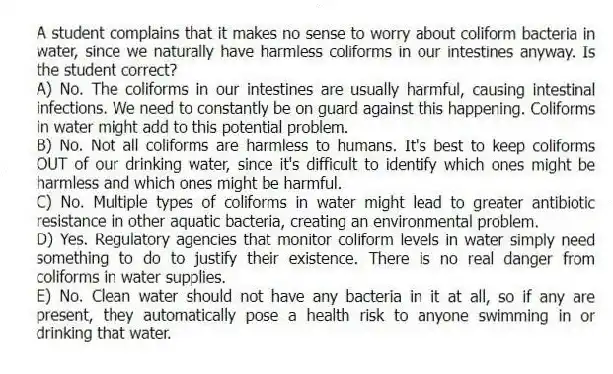
A student complains that it makes no sense to worry about coliform bacteria in water, since we naturally have harmless coliforms in our intestines anyway. Is the student correct?
A) No. The coliforms in our intestines are usually harmful, causing intestinal infections. We need to constantly be on guard against this happening. Coliforms in water might add to this potential problem.
B) No. Not all coliforms are harmless to humans. It's best to keep coliforms OUT of our drinking water, since it's difficult to identify which ones might be harmless and which ones might be harmful.
C) No. Multiple types of coliforms in water might lead to greater antibiotic resistance in other aquatic bacteria, creating an environmental problem.
D) Yes. Regulatory agencies that monitor coliform levels in water simply need something to do to justify their existence. There is no real danger from coliforms in water supplies.
E) No. Clean water should not have any bacteria in it at all, so if any are present, they automatically pose a health risk to anyone swimming in or drinking that water.
Correct Answer:
Verified
Q73: Which of the following is NOT associated
Q74: How could heavily fertilized lawns contribute to
Q75: The most medically relevant species of Pseudomonas
Q76: The genomes of free-living spirochetes are larger
Q77: What distinguishes Staphylococcus, species from Streptococcus, Enterococcus
Q79: Which of the following are spirochetes?
A) Borrelia
Q80: Rhizobium is considered an endosymbiont with plants.
Q81: You examine a patient who is complaining
Q82: You examine a patient who is complaining
Q83: You examine a patient who is complaining
Unlock this Answer For Free Now!
View this answer and more for free by performing one of the following actions

Scan the QR code to install the App and get 2 free unlocks

Unlock quizzes for free by uploading documents